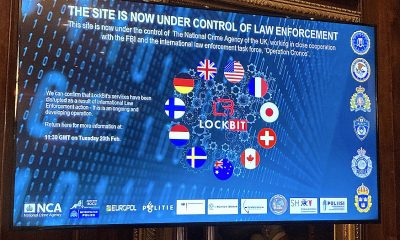General News
Why is building online privacy into our daily life even more important today?

By Mihai Rida, Privacy and cybersecurity expert, Director of Product Marketing, CyberGhost
Today, most people can be found to be sharing a wealth of information about themselves in some form or another online. By doing so, we open ourselves up to certain risks we should be aware of, Mihai Rida writes.
In an era of artificial intelligence, increasing government surveillance and increasingly sophisticated cybercrime techniques, it has never been more important to be aware of how to protect your privacy online.
From social media platforms to online shopping sites, we share a lot of personal information online, which can leave us vulnerable to cyber attacks, identity theft, and other online threats.
So if you haven’t really thought much about online privacy in the past, now is the time to do so.
What’s the risk?
Today, most people can be found to be sharing a wealth of information about themselves in some form or another online. This information isn’t just held by us but also by the companies we have shared it with in order to access their services.
When we share our information with companies, we open ourselves up to certain risks.
Even with companies taking greater care to protect their customers’ information, data breaches are still a major problem.
If companies aren’t careful or if they intentionally share customer data with third parties, this can result in spam advertising and further risks to your online security.
Reading the privacy policies of websites and apps before using them, whilst not a particularly fun task, is one way to help you make informed decisions about which websites and apps to use and what information to give out.
Yet, this won’t mitigate completely against data breaches or accidental sharing of data.
We are the greatest threat to our online privacy
Verizon’s Data Breach Investigations Report highlights that there were over 1000 incidents of data breaches in Europe in 2021, 307 of which resulted in confirmed data disclosure.
Europeans are well aware of this risk, with a survey by Eurobarometer finding that 46% of Europeans are concerned about the potential misuse of their personal data by companies.
Yet, whilst there is growing concern and awareness of how companies use our data, ultimately, the greatest threat to our online privacy is ourselves.
When we share information online, whether on social media, a business website, a review site or a dating app, we are sharing information that, when joined together, could enable someone to build up a picture of who we are and give them an insight into our interests, beliefs or concerns.
Couple that with the information you share when signing up for online accounts or shopping online, and your online identity could suddenly become much more complete than you would want it to be, especially if the wrong people came across it.
Be careful not to overshare
Online oversharing can therefore create serious risks, including identity theft and fraud.
It can also give malicious actors the tools to emotionally manipulate victims and make them prone to other attacks.
Take phishing attacks, for example — a common form of cybercrime.
Whilst many of these are random and unsophisticated, once a hacker has some initial information about you — which can include, for instance, the names of members of your family or colleagues, details about your job or the companies you have previously shopped with — they can become highly tailored and convincing.
According to the European Union Agency for Cybersecurity (ENISA), phishing attacks are the most common form of cybercrime in Europe, and we’re seeing no sign of this slowing down.
What can we do about it?
Building online privacy into your day-to-day life is an ongoing process that requires vigilance and effort. But by taking a little extra care and implementing a few extra safeguarding measures, you can protect your personal information and reduce the risk of cyber-attacks and identity theft.
The simplest and yet often compromised rule to protect your privacy is to be mindful of what you share online in the first place.
Be careful about what personal information you give out, particularly on social media platforms, dating sites or online forums.
Besides personal information such as your phone number or home address, sharing photos and videos online can also provide a huge amount of information to would-be snoopers, including information on your location, relationships and interests.
The same can be said for any opinions or updates you share on social media or elsewhere.
Think about your sharing settings and consider what you want to share completely publicly rather than just with family and friends.
Everything can be exploited in one way or another
Your browsing history and search data also provide a lot of information.
You might have seen this if you have searched for something online and the next minute receive a flood of adverts for related products all over your social media feed.
This is where privacy-enhancing tools such as ad blockers and virtual private networks (VPNs) can come in.
Ad blockers can play a vital role in stopping pesky companies from infringing on your privacy by blocking the use of cookies to track you whilst also speeding up webpage load times.
Of course, you’ll probably have heard people tell you about the importance of strong passwords already.
Yet, using strong passwords that are difficult to guess and different for each online account is one of the most effective ways to protect your privacy and security online.
Using a password manager to generate and store your passwords securely can be an effective tool to save you hassle trying to remember yours.
Two-factor authentication, on top of a strong password, provides an extra layer of security to protect your accounts from unauthorised access.
Public Wi-Fi networks might know everything about you
Day to day, many of us will use public Wi-Fi networks. They enable us to do work, shop online or enjoy a favourite tv series or podcast, all whilst on the move.
However, caution also needs to be taken with public Wi-Fi.
There is no guarantee that these networks are secure, and an experienced hacker can easily compromise them.
Whilst most websites are now encrypted (look for the https:// in the web address to check), not all are, and neither are all apps.
This provides a window through which someone could monitor your activity and see your requests and responses.
In addition, public Wi-Fi networks have notoriously wide-reaching terms and conditions for their privacy policies.
You should generally assume that you are agreeing to all your web traffic being tracked whilst on these networks.
Be aware that things are changing quickly
In the end, it’s prudent to be aware that the digital world, and the risks associated with it, are evolving fast.
Whilst this is an area that will keep developing, by incorporating these practices into your online habits, you can help take important steps towards building privacy in your online life.
Mihai Rida is the Director of Product Marketing at CyberGhost VPN, a privacy and cybersecurity expert, and a digital rights advocate.
At Euronews, we believe all views matter. Contact us at view@euronews.com to send pitches or submissions and be part of the conversation.
Disclaimer: No copyright infringement intended. All rights and credits reserved to respective owner(s).
























